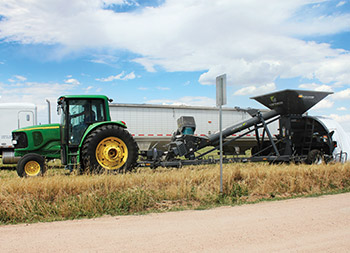As producers look to harvest a potential bumper crop, many will likely find themselves out of bin space. Of course, it’s too late to build more permanent storage, and cash prices will not likely be at a level where most farmers are willing to sell. This leaves them with one more option that they may not have considered previously: grain bags.
Whether being used for 20,000 or 1,000,000 bushels or more of corn, soybeans or other crops, grain bags offer producers a highly flexible, yet virtually unlimited, storage solution. The concept originated decades ago in South America and eventually worked its way into North America. Loftness® is one farm equipment manufacturer that realized the benefits for North American farmers and began developing grain bagging equipment in its Hector, Minnesota factory.

“There are many reasons why farmers may want to start bagging,” said Dave Nelson, senior vice president of sales for Loftness. “Some people simply need more storage capacity than their bins can hold. Some use it as temporary storage on rented ground. Some do it for the cost savings over bins. Others bag grain to reduce labor or to speed up harvest. By filling bags right in the field, it reduces the number of people required to haul grain, and it also helps keep the combines running.”
Most grain bagging equipment is designed for use with specialized 10-foot-diameter polyethylene bags, which can be up to 500 feet long and hold up to about 22,000 bushels of grain per bag. 12-foot baggers are also available, but most of these are purchased by commercial operations.
Two types of equipment are used for this type of storage: grain bag loaders and grain bag unloaders. The loaders have a large hopper to accept grain from a grain cart, combine or other auger. They can also be equipped with ground-level swing hoppers to load grain from hopper-bottom trailers. Many grain bag loaders can transfer grain into bags at rates up to 30,000 bushels per hour.
Grain bag unloaders, on the other hand, are designed to roll up the bag while unloading grain at fast rates. In fact, many unloaders can fill a 1,000-bushel trailer in only about seven minutes.
Grain can often be kept safely for months in bags without losing condition. “Once the bags have been sealed, the oxygen level is reduced, and the concentration of carbon dioxide is increased,” said Nelson. “This environment virtually eliminates fungal diseases and insects. The airtight environment also slows down the natural metabolic process that leads to increased temperatures in the grain, extending the storage life of the product.”
Nelson advises that grain bagging success relies heavily on proper site selection and bag placement. “The site should be on a clear, elevated, slightly sloped and firm section of land with no chance of flooding,” he said. “Check the site for any areas that do not drain naturally, and dig drainage channels to shed the water away from the grain bag storage site. Also, when selecting and preparing the site, keep in mind that machine traction is a very important process during the loading of the grain bags. Poor wheel traction will make it difficult to maintain the proper filling of the grain bag during the loading process.”
Additionally, it is recommended to check the bags weekly for punctures, especially from rodents, which can cause the most damage. Small damaged areas can be repaired with the bag manufacturer’s specified tape. However, if the damage is too great to be repaired with tape, the bag should be emptied and the grain loaded into a new bag. Unrepaired punctures in the bag can let in moisture, potentially leading to spoilage.
Although the concept is relatively simple, Nelson understands that grain bagging can be intimidating to those who have little or no experience. “At Loftness we’ve always offered to go out to the customer’s site to train them and get them comfortable with the process,” he said. “As more farmers start wondering what to do with this year’s crop, we anticipate making quite a few trips this fall.”





